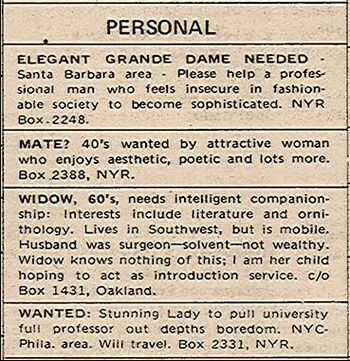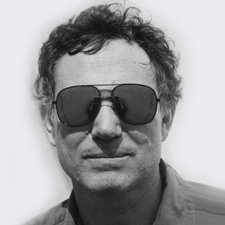Till You're Gone
"Single male, 30 years old, very handsome..."
 | |
| Series | |
|---|---|
| WBAI And NPR Playhouse | |
| Original Broadcast Date | |
| 3/10/1979 | |
| Cast | |
| Arthur Miller, Robin Bartlette, Tim Jerome, Paul Mantell, Irene Wagner, Eric Sears, Rosemary Foley, David St. James, Marcel Rosenblatt, Joe Frank. | |
| Format | |
| 56 minutes | |
| Chronology | |
| Preceded by: | A Call In The Night |
| Followed by: | The Death Of Trotsky |
| Purchase / Stream | |
Till You're Gone is a program Joe Frank produced as part of the series WBAI And NPR Playhouse.
Synopsis
Actors read singles' ads; could be actual ads.
1:40: (Jazz music) Joe tells of training for the Olympic decathlon, how strong he is.
2:50: (Disco music) He tries to study, but can't, goes to a club. He meets the Georgette the former head cheerleader. They dance, go to the beach, make love. A few weeks later Joe gets terribly sick with a venereal disease.
7: Doris and Philip are on the beach; he ogles a girl, she reacts jealously.
8:30: Actors read more singles' ads.
9:50: Joe addresses a large audience in a stadium, tells them about perfect love, apparently how to achieve it.
13:10: (Oompah band music) At a restaurant a guy (Arthur Miller?) says that Freud was affected by what he ate. A number of different actors talk about German/Austrian food and the ancient Teutons.
15: A couple (Doris & Philip?) at a restaurant talk about what to eat; they come onto each other, then get into an argument about what he has on his chin.
16:40: "Till You're Gone" - the song.[1]
17:40: Joe's riding on a train,[2] ends up in Newburgh. He's back in the town he grew up in, goes to his mother's home; she berates him for not having written, but it turns out to be the wrong address.
21:20: Joe's in battle, sounds like WW1 - a brigade of women in bathrobes attacks. He knocks one into a washing machine, which kills her.
23:20: Joe's at his mother's home, gets into an argument about his getting a job, not believing in God.
25:30: "Till You're Gone" - the song.
26: Doris and Philip are happy with their day; she's romantic, he fears he can't perform, which frustrates her. They can't agree.
30:30: "Till You're Gone" - the song.
30:50: Actors read more singles' ads.
31:50: A guy (Arthur Miller?) talks about getting in touch with feelings, how the failure to do that causes so much of the problems of modern society. Others join in the discussion: it's the consciousness-lowering group.[3]
37:30: Joe recounts falling in love with pianos.[4] He fell hardest for a piano in Palm Beach, slept in her. Later he makes millions on the stock market, goes back for her, promises to save her, love her eternally. "A Kiss Is Just A Kiss" accompanies the end.
43:20: An announcer reading a news story recounts how high-ranking Nazis escape after WW2, some to South America, some convert to Judaism, even becoming rabbis, some to Roman Catholicism. (Tchaikovsky's Symphony No. 6, third movement)
45:50: Joe asks if she remembers a train ride into the mountains (some are Austrian Alps); they collect the stuff people on a train riding to a concentration camp, keep as souvenirs. They're about to make love when Joe protests he was merely a minor functionary.
48:30: Actors read more singles' ads.
50:10: The consciousness-lowering group talks about the difficulties of relationships, critically evaluate Doris & Philip's relationship, the story of Joe returning home.
54:50: "Till You're Gone" - the song
A ticking clock, and music: "Your father was a picture on the wall. . ." Actors read personals ads. Joe talks about a brief beach-side fling with a woman when he was a college athlete. A couple on the beach, Philip and Doris, fight about looking at other women. A panel discussion about the importance of Freud's diet and the origin of German food. Philip and Doris fight in a restaurant. Joe visits the town of his childhood and is berated for not having written by the wrong mother. Joe is in a battle against an army of women in a laundry room. Joe visits his mother. Philip and Doris fight in bed. A consciousness lowering group. Pianos as lovers. A mock movie news program about German war criminals disguised as Latinos, observant Jews, catholic priests. Second person reminiscences about love among Nazis. An academic discussion and interpretation of the acted scenes.
Music
- original music performed by Arthur Miller [Intro]
- "Cool Out" - Leroy Hutson (from Hutson, 1975) | YouTube [1:27]
- "Spring Rain" - Silvetti (from Super Disco Sound, 1976) | YouTube [3:01]
- "Valley of the Shadow" - Thomas Newman (from Little Women Soundtrack, 1994) | YouTube (Added later)[5] [18:44]
- "Solo - In Memory Of His Father, Harry L. Evans" - Bill Evans (from At Town Hall Volume One, 1966) | YouTube [37:18]
- "Medley: Paris Montage" - Charles Gerhardt / National Philharmonic Orchestra (from Casablanca - Classic Film Scores For Humphrey Bogart, 1974) | YouTube [42:31]
- "Symphony No. 6: Third Movement" - Eugene Ormandy and The Philadelphia Orchestra (from Pyotr Ilyich Tchaikovsky – Symphony No. 6 In B Minor ("Pathetique"), 1960) | YouTube [43:15]
- "Children Of Lima" - Woody Herman (from Children Of Lima, 1975 ) | YouTube [45:36]
Additional credits
The original broadcast credits state: "Written and produced by Joe Frank. Directed by Arthur Miller, with sound by David Rapkin. The performers included Arthur Miller, Robin Bartlette, Timothy Jerome, Bernie Mantell, Irene Wagner, Eric Sears, Rosemary Foley, David St. James, Marcel Rosenblatt, and Joe Frank. The theme song was performed by Arthur Miller."
Footnotes
- ↑ This song, written for the show, was performed by Arthur Miller.
- ↑ the stops sound like a train north of NYC
- ↑ originally aired in Arena
- ↑ The first piano was at the hungry i in Chicago, Joe says; the hungry i was in San Francisco
- ↑ Joe added music to several of his shows when they were rebroadcast or digitized. The updated versions are usually available at Joefrank.com
